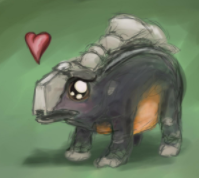The festival that my local guide called the Ta-on had begun when I emerged on my balcony that morning. The music had begun playing as I ate my morning meal, drums, horns and an instrument my guide told me is made coconut shells, filled with dried seeds.
As I peered down from where I stood, I could observe the procession of revelers heading towards the grand park in the city center, where the festivities would take place in true style. Men, their bare chests painted in pinks and blues, danced in the street, while female dancers played the instruments I had heard. Some had small drums hanging from their waists, which they played with their hands. A number of the city guard road horses behind the dancers, their armour was discarded for traditional dress. A few children ran between the horses - who I must say were surprisingly well trained as to not spook at the small rapscallions.
Hundreds like myself watched from the sides of the road, cheering and throwing coloured powder at the parade, staining everything and everyone in clouds of blue, red, pink and orange.— The Travels of Yarius Antoni
Ta-on is a festival of spring, fertility and the fire goddess Raha, an interpretation of the Divine
Raya. Celebrated by the
Aiata people of
Elebih primarily, it is also observed by Aiata abroad in
Serono, and by the
Yedih colony of
Rhait'tius, due to its proximity to the Elebihian territories in
Lissimo.
The origin of Ta-on is old, having arisen under the Seventh Republic over four hundred years ago. The worship of Raha had been introduced from Lissimo around a hundred years before by merchants and diplomats returning from station in the colonies. When the
Atira of Elebih was established in 1 FT (2920 YSB) to unite the waypreists of Raha under a single banner in the wake of the
Kutuhun War, the festival began as the Atira's first organized act.
The original intention of the festival was to unite the people of Elebih after the atrocities of the war, and in that manner it succeeded. It took on a life of its own in the following decades, growing in popularity and broadening from a spring celebration to become a fertility festival.
Observance
The festival is observed on the 7th day of Spring. The largest of the Ta-on festivals is held in Elebih's capital of
Kamatu. A procession begins just after sun rise, where dancers and musicians make their way through the streets from a Temple of Raha to the city park, often accompanied by representatives of the city guard and the priests of Raha. Members of the public watch from the sides of the street, throwing coloured powder made from crushed seashells.
At mid morning, the revelers gather in the city park and food is served - traditionally barbecued over open fires, along with copious alcohol. It is tradition for the Ta-on to be the first day where someone who has turned 16 in that year to drink alcohol.
An effigy of Raha is erected in the park, though some cities have permanent statues, and symbolic sacrifices of grain, meat and alcohol are placed at the foot of Raha. They are blessed by the priest, and then the festival is opened. The sacrifices are burned by priests later.
Numerous vendors operate during the festival, often informal stalls selling trinkets, holy tokens, jewellery and sweets. Lovers are expected to give each other gifts during Ta-on, as a symbol of their love, which they often buy from these vendors.
Late into the night, the food and alcohol is served. Throughout the day crowds gather to hear epics of the Aiata people's history, watch traditional dances, drink and mingle.
A dance is held in the evening for those without lovers. Dancers wear crude painted masks and change partners every few minutes until they find a perfect partner and choose to leave together for the evening. The unlucky who find no partner stand vigil over the temple of Raha for the night.
No work is expected to be done the next day, and Elebih is often extremely quiet as the revelers sleep off their hangovers.






As always, the narrative excerpt combined with the facts works so well and adds that extra layer of depth and immersion to your world :D I'd love to observe a festival like this in person!
I just finished some new art in my latest article: Pinecrest College of Aviation!
thanks TJ :)